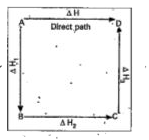State and explain the Hess's law of constant heat summation. Solution in Telugu
Hess.s law states that the total amount of heat evolved or absorbed in a chemical reaction is always same whether the reaction is carried out in one step (or) in several steps.
Illustration : This means that the heat of reaction depends only on the initial and final stages and not on the intermediate stages through which the reaction is carried out. Let us consider a reaction in which A gives D. The reaction is brought out in one step and let the heat of reaction be △H.
A→D,△H
Suppose the same reaction is brought-out in three stages as follows
A→B,△H1
B→C,△H2
C→D,△H3

The net heat of reaction is △H1+△H2+△H3
According to Hess law △H=△H1+△H2+△H3
Ex : Consider the formation of CO2. It can be prepared in two ways.
1) Direct method : By heating carbon in excess of O2.
C(s)+O2(g)→CO2(g):△H= -393.5 kJ
2) Indirect method : Carbon can be converted into CO2, in the following two steps.
C(s)+12O2(g)→CO2(g),△H1=−110.5kJ
CO(g)+12O2(g)→CO2(g),△H2=−283.02kJ
Total △H=−393.52kJ(△H1+△H2)
The two △H values are same.
Topper's Solved these Questions
- THERMODYNAMICSBook:VIKRAM PUBLICATION ( ANDHRA PUBLICATION)Chapter:THERMODYNAMICSExercise:Long Answer Questions
Explore 4 Videos
- THERMODYNAMICSBook:VIKRAM PUBLICATION ( ANDHRA PUBLICATION)Chapter:THERMODYNAMICSExercise:Important Questions
Explore 41 Videos
- THERMODYNAMICSBook:VIKRAM PUBLICATION ( ANDHRA PUBLICATION)Chapter:THERMODYNAMICSExercise:Very Short Answer Questions
Explore 37 Videos
- THE S-BLOCK ELEMENTS Book:VIKRAM PUBLICATION ( ANDHRA PUBLICATION)Chapter:THE S-BLOCK ELEMENTS Exercise:LONG ANSWER QUESTIONS
Explore 12 Videos
Similar Questions
State and explain the Hess's law of constant heat summation.
View SolutionDefine a system. Give an example.
View SolutionWhat is the information given by the terms thermodynamics?
View SolutionJustify the inclusion of alkali metals in the same group of the periodic table with reference to the following.
(i) Electronic configuration.
View SolutionHESS'S LAW OF CONSTANT HEAT SUMMATION
View SolutionHess's law of constant heat summation is bases on
View SolutionHess's law of constant heat summation is bases on
View SolutionState and explain Hess's law of constant heat summation.
View SolutionState and explain Hess's law of constant heat summation.
View SolutionState and explain the Hess's law of constant heat summation.
View SolutionDefine Hess's law of constant heat summation.
View SolutionWhat are the applications of Hess's Law of constant heat summation?
View SolutionState Hess's law of constant heat summation.
View SolutionState Hess's law of constant heat summation.
View Solution(i) State annd explain with example the Hess's law of constant heat summation.
(ii) Show that Hess's law is simply a corollary of first law of thermodynamics.
View SolutionDefine Hess's law of constant heat summation.
View Solution

